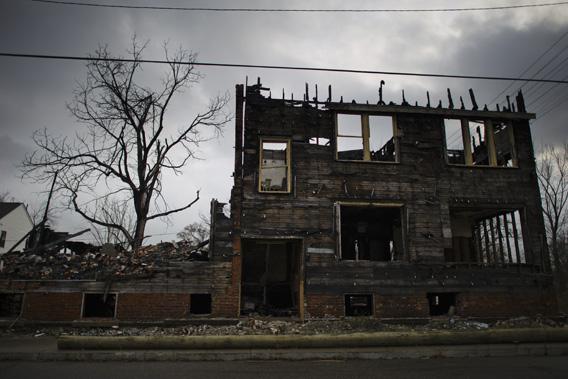Yesterday, Detroit’s Chapter 9 bankruptcy filing was greeted with sadness by those with personal or emotional attachments to the city. But while you wouldn’t want to call it a cause for celebration, there’s no need for mourning either. The genuinely sad thing about Detroit is not the bankruptcy but the circumstances that induced it—decades of economic and population decline amid deteriorating public services and civic conditions. The bankruptcy itself, however, is not the decline. It’s a sensible step forward that at least gives the same city some chance for the future. And it raises the question of why more local governments with fiscal problems don’t file for bankruptcy.
After all, in the corporate world, while no CEO is excited to take his firm through bankruptcy, it’s widely recognized as a valid strategic move. If the appropriate legal framework were in place, it’s also a move that could be advantageous for cities like Providence, R.I. and Baltimore as well as smaller Michigan municipalities rocked by the same large economic trends as Detroit.
American Airlines filed for bankruptcy in December 2011, and through bankruptcy has managed to once again emerge as a profitable company. In its reinvigorated form, it’s merging with US Airways and like many airlines before it, it will be much stronger post-bankruptcy than pre-. More recently, bankruptcy helped bring Twinkies back from the brink of extinction.
Personal bankruptcies, by the same token, are a sign of bad economic circumstances, but the relative ease of obtaining them in the United States is a source of national economic strength. Americans can take economic risks—starting businesses or moving to new cities—secure in the knowledge that if things don’t work out they’ll be able to shed debts and start over again. Without access to bankruptcy, both firms and individuals would be endlessly crippled by the mistakes of the past.
But while American law allows firms and households to discharge debts in bankruptcy relatively easily, the municipal bankruptcy process is much more difficult. Even cities in quite a bit of financial distress rarely file for bankruptcy, and when they do, their petitions are often rejected, as happened to Harrisburg, P.A. in November 2011 after a disastrous incinerator project landed the city in tough financial straits. The fact that Detroit is only taking this step now, even though it’s been a byword for urban decline and distress for years, is a sign of how rare the bankruptcy course is. We ought to change that. Local governments are very different from private businesses, but they’re similar in the sense that past mismanagement can make future progress impossible without the opportunity to shed debts.
In the case of Detroit, while the causes of long-term decline are complicated, the sources of fiscal distress are pretty simple. The city’s lost 28 percent of its population since 2000, and it’s lost well over half its population since its peak of 1.8 million residents in the 1950 census. The larger Detroit of the past took on obligations to bond holders and pensioners that today’s smaller Detroit can’t possibly pay without further devastating city services. Heavily taxing the remaining residents and businesses to pay off old debts simply ensures that the city’s tax base will keep shrinking.
Of course, if you think of “Detroit” as a person, this is just Detroit getting its comeuppance for past sins. But a city is more like a company in the sense that the managers who created the problems are usually gone by the time the reckoning comes. And even the best managers can’t turn a city around unless they can direct a much larger share of the city’s revenue to current services rather than paying off old debts.
Making it hard for cities to shed old debts in bankruptcy does have one benefit—if municipal bankruptcy were easier, lenders would be more reluctant to lend cities money. But the relative ease with which cities can borrow money is at least as much a bug as a feature. Politicians operate with relatively short time horizons—they often face term limits or have ambitions for higher office—that encourage them to incur long-term obligations that don’t really make sense. Municipally subsidized stadiums and convention centers are particularly tempting to local politicians who like the ribbon cutting and don’t care if the economic impact studies commissioned by local boosters meet any kind of reasonable standard. And for a mayor looking to make nice with the municipal workforce without shelling out for unpopular tax increases, there’s nothing easier than a promise of future pension benefits that his successor will have to figure out how to pay for.
If it were easier for cities to go bankrupt, lenders would scrutinize these projects more closely, recognizing that bum debts are likely to be repudiated. Union leaders who regarded pension promises as low-credibility would focus their bargaining on more transparent salary demands. Cities would, overall, be better governed.
The fear of municipal bankruptcy is driven in part by the perception that one city going bankrupt imposes costs on other municipalities in the same state. That’s a completely reasonable concern, but as Clayton Gillette has argued it could be fixed by making the process more robust and allowing bankruptcy judges to impose tax increases and asset sales as part of the settlement. The idea is to ensure that bankruptcies are driven by real inability to pay rather than a mere lack of political will. What’s more, the pile of terrible press Detroit is getting today underscores the fact that prudent politicians are going to be reluctant to be “the guy who drove City X into bankruptcy” even when it makes the most sense.
But it’s silly to let the mistakes of the past prevent a city from having a future, and naive to think that cheap debt is an unmitigated blessing in the municipal context. Corporate America would be much worse off without relatively easy access to reorganization through bankruptcy, and America’s cities and towns should have much the same.
